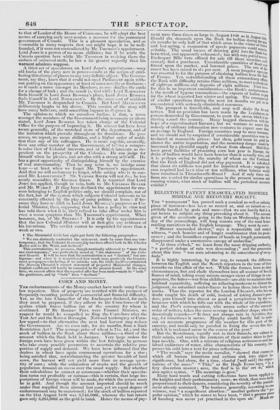CORN AND MONEY.
Ties embarrassments of the Money-market have made many Corn- law repealers. Men of property are terrified with the prospect of frequently-recurring periods of commercial and financial difficulty. Yet, as the late Chancellor of the Exchequer declared, for such they must be prepared, it' they adhere to the Corn-laws—if the system which forces bullion out of the country for wheat is continued. It' Sir ROBERT Pain. were Finance Minister, we suspect he would be compelled to fling the Corn-laws after the Test Act and the Rotten Boroughs. National bankruptcy or Corn- law repeal—to that alternative the next bad harvest may reduce the Government. Arc we even safe, for six months, front a Bank Restriction Act ? The average price of wheat is 718. 4d. ; and the stock of bullion in the Bank about three millions—a third of the amount which the Bank held in January. Very large orders for foreign corn have been given within the last fortnight, by persons who take every possible precaution to ascertain the relative pro- portion of supply and demand. We have been intbrined that the dealers in wheat have again commenced operations for a rise ; being satisfied that, notwithstanding the greater breadth of land sown, the harvest will not yield more than an average quan- tity of corn ; while the exhaustion of stocks and the growth of population demand an excess over the usual supply. But whether their calculations be correct or erroneous—whether their specula- tion turns out profitable or ruinous—this is certain, that large im- portations of foreign wheat will be made, for which the return must be in gold. And though the amount imported should be much under that supplied front abroad last year, yet an equal degree of embarrassment may be occasioned ; for the stock of bullion reported on the 21st August 1838 was 9,746,0001., whereas the last return gave only 3,265,0001. as the gold in hand. Hence the means of pay- molt were three times as large in August.1838 as in August ;819 Should the demands upon the Bank for bullion during thence six months be only halt' of that which arose in the win teroeriti" and last spring, a suspension of specie payments would seen,:
in.
(whitish,. The usual means of drawing gold into the Bank bare been tried, and apparently exhausted ; but with very partial suca;; Exchequer Bills were offered for sale till those securities es ,-,j scarcely find a purchaser. Considerable quantities of Stack ,e'r, forced upon the market, and lowered prices. The rate of di: count has been raised to six per cent. A most irregular opera: was resorted to for the purpose of obtaining bullion from the tank of France. Yet, notwithstending all these extraordinary efforts, the Bank with difficulty retains three millions, to meet acirculs4 of eighteen millions and deposits of eight millions. ;Aid to_ for this is an important consideration—the Bank's entharrasselept is the result of bygone transactions—the exports of bullion to pay for the wheat imported last winter and spring. The consequence of similar operations during the next six months arc yet to le encountered with seriously-diminished resources. The prospect is finanidable, and may well shake the finnest nerves. But no provision has been made by the Legislature, au powers demanded by Government, to avert the storm which is ga. thering naind the country. Many hugged themselves with the hope of a superabundant harvest ; but we venture to assert that nobody ol'ordinary information now ventures to expect more than an average in England. Foreign countries may be more fortunate, anti we should not be surprised if considerable quantities were in.
troduced at reasonable prices : but then, gold must be paid fie almost the entire importation, and the monetary danger wouldbe increased by a plentiful supply of wheat from abroad. Had there been great theilitics of procuring corn last year in Europe, the drain of bullion would have been heavier than at actually was; and it is perhaps owing to the scarcity of wheat on the Continent
that the Bank of England did not stop payment. It is calculated that about six millions was paid for imported wheat : suppose the
sum required had been amine or ten millions, what balance would have remained in Threadneedle Street ? And if only three mil• lions are wanted for similar operations in the present autumn and ensuing winter, what stock of bullion will the periodical accounts exhibit ?


























 Previous page
Previous page